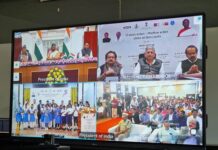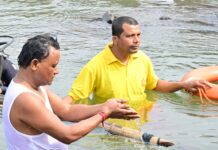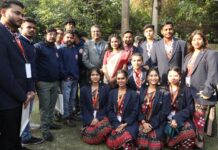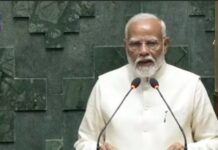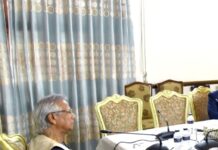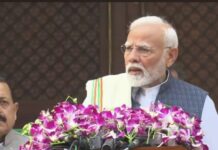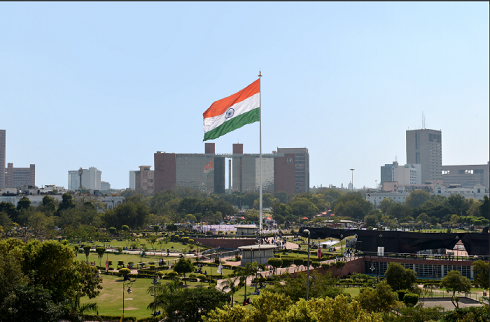By Our Correspondent
NEW DELHI/BHUBANESWAR: The Jindal Steel and Power Limited Chairman and 2 times Former Congress MP, Naveen Jindal while wishing the Nation on 74th Independence Day, was on Saturday wrote a blog titling “Independence Day Pledge: India’s Onward March Will Continue For All Times To Come,” that was uploaded at link.medium.com and shared by the JSPL Boss in his official tweeter handle@MPNaveenJindal with an Indian Tri-Colour.
The JSPL Chairman while lauding the Prime Minister Narendra Modi’s ‘Aatmanirbhar Bharat’ as well as encompassing slogans like ‘sabka saath, sabka vikas’, said India works overtime towards the $ 5 trillion economy vision.
“The Narendra Modi government has continued with India’s developmental journey with all-encompassing slogans like ‘sabka saath, sabka vikas’. While GST, ease of doing business, ‘Aatmanirbhar Bharat’ are potential game-changers, targets like the $ 5 trillion economy vision will make the country work doubly hard,” Jindal wrote.
“Like the earlier times, the Modi years, too, have faced their share of challenges. The Covid-19 pandemic is the biggest civilisational crisis that the world faces today, which, in turn, has severely impacted global economic growth. The Union Government, along with state governments, has responded well to the crisis.This Independence-Day, we must also look at the missed opportunities, and learn lessons for the future,” the JSPL Chairman clarified.
“For most of the first three decades of our Independence, India had to be content with, what has been described as, the Hindu rate of growth — a growth rate of around 3.5 per cent. Many have linked this with the Soviet-inspired planned economy model that we followed in the pre-liberalisation India. For a country striving to grow out of poverty, this rate of growth was just not good enough,” he said.
This was also the period of socialist orientation when wealth creators and businesses were seen with suspicion. It’s only in the post-liberalisation era, particularly in the last few years, that governments have acknowledged that the wealth creators need to be respected and encouraged. The need to encourage job creators and entrepreneurs has been appreciated only in the recent years.
The decades of 60s and 70s also saw moves like bank nationalisation and coal nationalisation. Insurance was also nationalised. More recently, 2 G licences and then coal blocks were cancelled, adversely impacting the economy. Some of the damage will, hopefully, be undone by moves like coal reforms, India’s leading Steel Maker, Jindal said.
One of the biggest misses, however, has been our inability to convince our fellow citizens on smaller families. We may be 138-crore strong, but we have not succeeded in stressing on quality human resources. It took us more than three decades but I am happy that we have now come up with a new Education Policy.Skilling, linking higher education to employability and encouraging students to turn innovators and entrepreneurs are a must for India’s forward march.
When we renew the National Pledge on the 74th Independence Day, we must keep in mind our learnings of the past. We have to strive for a better future — for the people and the nation. In the immediate context, we have to beat the rampaging virus and ensure that India is back in the best of health, he wrote.
“United by the Tricolour, and a common sense of national purpose and vision, the 74th year of our independence, we hope, will see India take giant strides in healthcare, infrastructure development, economic growth and participatory democracy. In New India, may everyone contribute to the best of their abilities, in a conducive environment, created by governments, regulators, and all other stakeholders. This is particularly relevant as India works overtime towards the $ 5 trillion economy vision.We have successfully faced the past challenges; we will come up trumps this time, too.May the onward march of India continue for all times to come,” the JSPL Chairman hoped.
Reminding about India’s glorious history, Jindal wrote “Independent India’s journey has been one of perseverance, determination, and national renewal — the ability to unitedly rise to the occasion every time the country has faced a crisis, be it a war, famine or pandemic. That each time the combined Indian might has trumped adversities, is a fitting tribute to the founding fathers of the Republic — who fought and won against the mightiest of adversaries during the Freedom Struggle,”.
What is significant is that during each such crisis, the citizens, workers, youth, teachers, scientists, businesses, and leaderships worked hand in hand, with a sense of purpose and national vision.When India got Independent, more than 80 per cent of its people were not lettered. While its share of world income was more than 22 per cent in 1700, it had come down to less than 4 per cent around Independence. This is just a snapshot of challenges faced by the people, and the first Prime Minister Jawaharlal Nehru, then.From his “Tryst with Destiny” speech to laying down a template for Modern India, Pandit Nehru modernised India, and created institutions that remain to date the Temples of Modern India.
Yes, there were reverses, like the Sino-India war, but a nascent Independent India recovered in no time, as the subsequent war with Pakistan of 1965, as also in 1971, showed. India also successfully faced challenges like perennial food shortages, food imports, and famines.
The then Prime Minister Lal Bahadur Shastri created necessary conditions and infrastructure which enabled scientists like M S Swaminathan and others to sow the seeds of Green Revolution.
The poor remained at the core of state policy as Indira Gandhi gave the clarion call of ‘Garibi Hatao’. Farm credit got a major boost in her tenure and she showed what it takes to be a strong leader with the creation of Bangladesh.
This was the period that saw the birth of the Middle Class, a process that got an impetus under Rajiv Gandhi. Rajiv Gandhi fathered the telecom and IT revolutions in the country, fruits of which continue to be reaped by future generations of Indians.In 1991, the country faced an embarrassing Balance of Payment crisis, but like on earlier occasions, the response was swift and comprehensive. The duo of P V Narasimha Rao and Manmohan Singh ushered economic reforms, unshackling India, and making it easy for the Indian enterprise to thrive and contribute to nation-building.
The charge that India was a ‘soft state’ was suitably countered by the Atal Bihari Vajpayee government with India becoming a nuclear power with the Pokhran tests. There were challenges like Kargil, but the armed forces rose to the occasion and did the country proud. Vajpayee also undertook second-generation reforms, including the much-talked about disinvestments.
If poverty and lack of accountability continued to remain pressing challenges, the Manmohan Singh years saw timely interventions in form of the MNREGA , RTI and Food Security, amid high growth, the JSPL Chairman added.



